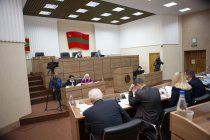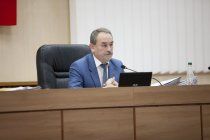 Русский
Русский English
English-







Debts for housing services and industrial safety
One of the issues included to the agenda of the plenary meeting was the law-in-draft supplementing the norms of the Housing Code. It was considered by the Supreme Council in the second reading and relates to debts for utilities.
Currently, the amount of the population’s debt to energy supplying organizations and organizations that manage apartment buildings for the provided housing and communal services is more than 150 million rubles in the republic. As a result, housing and communal organizations suffer losses. According to statistics, the wear of utility networks is from 70 to 90%.
The deputies of the committee on state regional policy came up with a legislative initiative: when the ownership of the property is transferred to the new owner, obligations on payments for housing and utilities are also transferred. This should be reflected in the relevant contract.
The Supreme Council supported this draft law and unanimously adopted it in final reading.
It is proposed to devote three months to resolving all issues related to the new procedure for drafting contracts for the sale of real estate, as well as developing by-laws.
In addition, the parliament supported amendments and additions to the law “On Industrial Safety of Hazardous Production Facilities”. The document was proposed by the Government and was considered in the second reading. It was prepared in the framework of harmonization of the legislation in force in the PMR with the legislation of the Russian Federation as well as to simplify the activities of business entities.
The Russian Federation has a law that divides hazardous production facilities into classes, depending on the level of potential danger.
Now equipment and facilities will be divided into three hazard classes. The frequency of inspections of such enterprises and their equipment will depend on the hazard category. Enterprises whose equipment will be assigned to the third class will not be checked.
Deputies of the Supreme Council agreed that this approach will lead to the optimization of administrative procedures for small businesses that operate, as a rule, hazardous production facilities of the second and third class. In addition, according to parliamentarians, the effectiveness of state supervision will be increased in relation to production facilities of the first hazard class.







